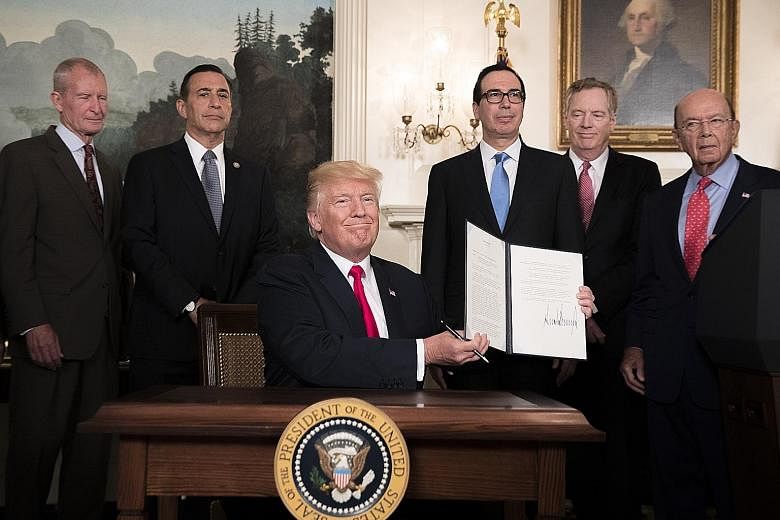China will take actions to defend its interests if the United States damages trade ties, the Commerce Ministry said yesterday, a day after US President Donald Trump authorised an inquiry into China's alleged theft of intellectual property.
Slamming the move as one of "strong unilateralism", the Chinese Ministry of Commerce accused the US of being "saboteurs of multilateral rules", as the trade probe would violate international rules.
The ministry was repeating a statement it had made earlier: that as a World Trade Organisation (WTO) member, any trade measures the US wanted to impose should comply with WTO rules.
"We want the US trade representative to respect the facts and act cautiously," said the statement yesterday. "If the US takes measures to hurt the two countries' trade and economic relations with no respect for multilateral trading rules, China would definitely not sit back, but would take necessary measures to safeguard our legitimate rights."
China's official Xinhua news agency echoed this point in an editorial yesterday, denouncing Washington's move as a unilateral "baring of fangs" that will hurt both sides. "Under this investigation, the US government is simultaneously police officer, prosecutor and jury," it said.
It added that the international community's opposition to Section 301 - the part of US law used to trigger the investigation - is why the US shelved the 43-year-old law in favour of the WTO's dispute settlement mechanism in the 1990s.
"That the US government is now resurrecting these dusty legal tools to deal with economic and trade issues is concerning," said Xinhua.
But Chinese analysts said that Beijing recognises that Mr Trump's latest move is consistent with his transactional approach to foreign relations.
And with the trade investigation expected to take upwards of a year, the President's executive memo is more of an opening gambit than a closing move in ongoing trade negotiations with China.
"It indicates the US had expected more from the 100-Day Action Plan agreed at the Xi-Trump meeting at Mar-a-Lago, Florida, and the China-US Comprehensive Economic Dialogue in Washington last month," China Institutes of Contemporary International Relations research fellow Yu Xiang told China Daily.
And despite Mr Trump's claim that his order is "a very big move", Renmin University's Sino-US expert Jin Canrong told The Straits Times that the long lead time for US Trade Representative Robert Lighthizer to conclude his investigation signals room for negotiation, and that the manoeuvre is aimed as much at voters and the special interests that had put Mr Trump in the White House as it is at China.
"It is a display: Trump wants to show his voters that he is keeping his election promise to 'do something' about China," said Professor Jin, who is associate dean of Renmin's School of International Studies.
Dr Yu also noted that part of the trade investigation would include negotiations with Beijing, which means China will have some latitude to discuss some of the issues raised away from the public eye.
With both sides having agreed to iron out a one-year action plan of economic cooperation during the first China-US Comprehensive Economic Dialogue in July, Mr Trump is hoping that he would be able to extract greater concessions from China after ordering the probe, said Prof Jin.
"It is a negotiating posture to show that he (Mr Trump) isn't satisfied with China's initial concessions on trade in the first 100 days," said Prof Jin. "China will definitely give way more, but only if it is reciprocal, and not unconditional."
SEE WORLD, OPINION:
3 CEOs quit White House committee


